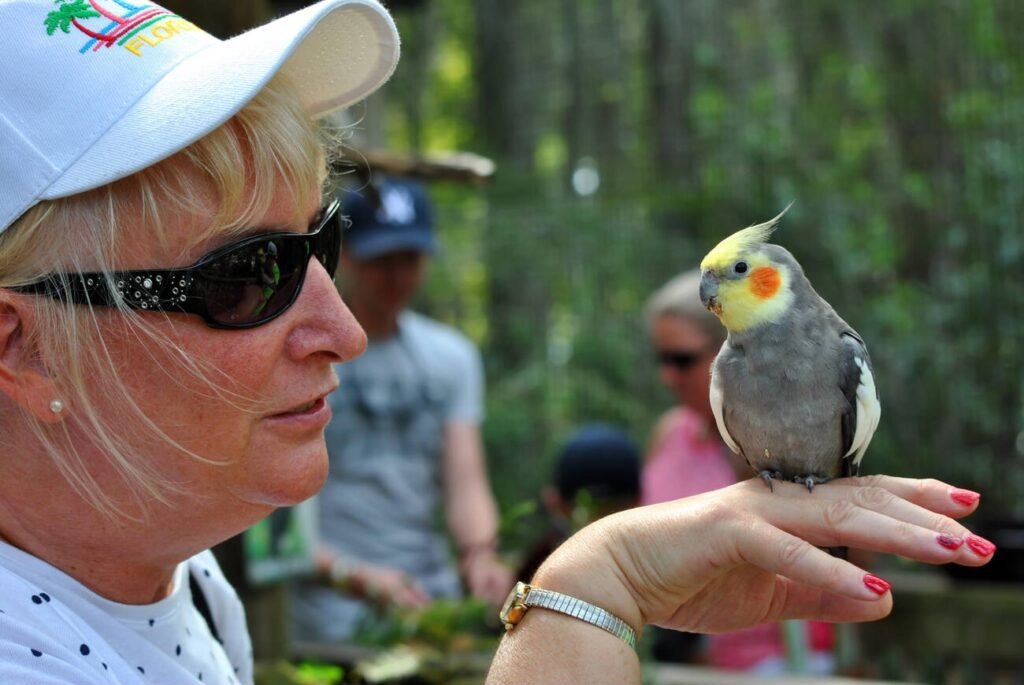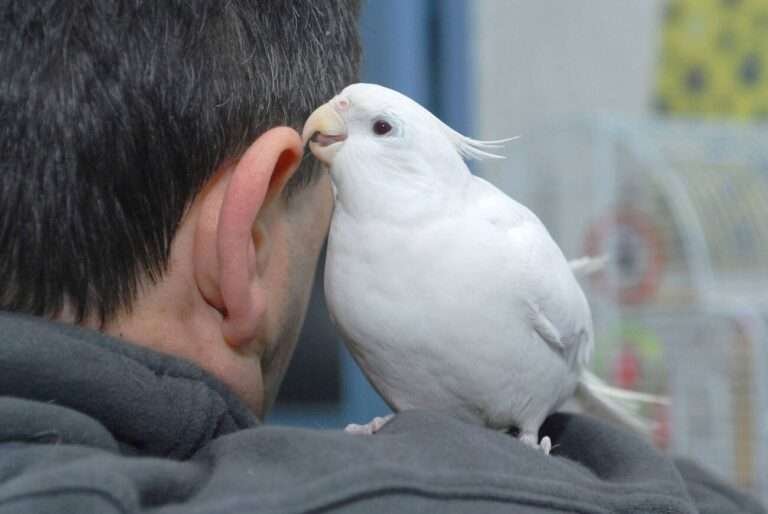Cockatiel DNA Test Process and Cost

I have many enjoyable moments with my cockatiels because I love these birds very much. I run a small cockatiel farm, and I have tamed two of them, which are my absolute favorites. Both are male cockatiels, and I confirmed their gender through DNA testing. Ensuring the gender of your cockatiels is crucial, especially when breeding, which is why DNA testing is an important factor for breeders. It helps identify not only the bird’s gender—male or female—but also whether the bird is an adult, semi-adult, or a baby, ensuring proper care and breeding management based on their age.
Cockatiels are charming and intelligent birds, known for their vibrant personalities and beautiful plumage. However, determining the gender of a cockatiel can be challenging, as the physical traits between males and females can be subtle or even indistinguishable in certain mutations. For cockatiel owners, breeders, or bird enthusiasts, knowing a bird’s gender is essential for various reasons, including improved care, better breeding management, or simply to satisfy curiosity.
One of the most reliable methods for determining a cockatiel’s gender is through DNA testing. In this blog post, we’ll take an in-depth look at the DNA testing process, the associated costs, and the benefits for both pet owners and breeders. Additionally, we’ll explore how DNA tests can provide insights beyond gender, including information on genetic health and other traits that can aid in the overall care of your cockatiels.
Why Consider DNA Testing for Your Cockatiel?
DNA testing provides a scientific, accurate, and non-invasive way to determine the gender of your cockatiel. Unlike relying solely on physical traits or behaviors, which can sometimes be misleading, a DNA test offers nearly 100% accuracy. Here’s why you might consider getting your cockatiel DNA-tested:
Gender Identification
Many cockatiel mutations do not show clear visual differences between males and females, especially when they are young. Physical traits like cheek patches, tail barring, or size differences may not be reliable, making DNA testing the gold standard for gender identification.
Breeding Programs
If you are a breeder, accurately identifying the gender of your birds is crucial for pairing the right birds together. This helps prevent accidental breeding, reduces stress in your flock, and ensures you’re producing the healthiest chicks.
Health Insights
While gender identification is the primary reason most people opt for DNA testing, some advanced tests can also reveal genetic predispositions to certain health issues. This can help you take preventative measures and make better-informed decisions about your bird’s care and treatment.
The DNA Testing Process
DNA testing for cockatiels is a straightforward and non-invasive process that involves collecting a small sample of genetic material from your bird. The sample is then analyzed in a specialized laboratory to determine the bird’s gender. Here’s a step-by-step breakdown of the process:
1. Sample Collection
The first step in the DNA testing process is collecting a sample of your cockatiel’s DNA. There are two main methods of obtaining a DNA sample from a bird:
Feather Sample
One of the most common and least invasive methods is plucking a few feather follicles from your bird. The feathers need to be freshly plucked, as they contain the necessary genetic material in the quill. This method is simple and painless when done correctly, although it’s recommended that a veterinarian or an avian specialist perform it to avoid any undue stress to the bird.
Blood Sample
A blood sample can also be used for DNA testing. This is typically done by a veterinarian, who will make a small incision to collect a drop of blood. Although this method is slightly more invasive than feather sampling, it is also highly reliable and commonly used in professional breeding programs.
2. Sending the Sample to a Laboratory
Once the sample has been collected, it is sent to a specialized laboratory that performs DNA testing on birds. There are many avian DNA testing labs around the world, and the sample can usually be mailed directly to the lab in a secure package.
3. Laboratory Analysis
At the laboratory, the DNA is extracted from the feather follicle or blood sample and analyzed. Technicians look for specific genetic markers that determine the bird’s gender. The process involves examining the chromosomes, with male birds having ZZ chromosomes and females having ZW chromosomes. This genetic difference allows the lab to accurately identify whether your cockatiel is male or female.
4. Receiving the Results
The turnaround time for receiving DNA test results can vary depending on the laboratory and the testing method used. Typically, you can expect to receive results within a few days to a couple of weeks. Some laboratories offer expedited services for an additional fee if you need the results sooner.
Once the analysis is complete, you’ll receive a report that clearly states your cockatiel’s gender. Some laboratories may also provide additional genetic information, such as insights into your bird’s potential health risks or traits.
Factors to Consider Before Opting for DNA Testing
Before deciding to get your cockatiel DNA tested, there are a few factors to take into account, including the cost, accuracy, and the potential health implications of the results.
1. Cost of Cockatiel DNA Testing
The cost of DNA testing can vary depending on the provider, the type of sample used (feather or blood), and any additional services offered by the laboratory. On average, you can expect to pay between $20 to $50 per bird for a standard gender identification test.
Some laboratories offer discounts for breeders or those testing multiple birds at once. There may also be package deals that include additional genetic testing or faster result processing. It’s essential to research different laboratories and compare their prices and services before making a decision.
2. Accuracy of DNA Testing
DNA testing is one of the most reliable methods for determining a bird’s gender, with an accuracy rate approaching 99%. However, the reliability of the results depends on the quality of the sample and the expertise of the laboratory performing the test. To ensure accurate results, it’s crucial to choose a reputable laboratory with experience in avian genetics.
3. Health Implications and Genetic Insights
While the primary purpose of DNA testing for most cockatiel owners is gender identification, some advanced tests can also uncover genetic predispositions to certain health conditions. For example, some tests may identify markers for heart disease, immune deficiencies, or feather disorders. These health insights can help you take preventative measures to improve your bird’s quality of life and longevity.
Why Gender Identification is Important for Cockatiel Owners
Knowing your cockatiel’s gender can significantly impact how you care for your bird. Here’s a look at how gender can affect behavior, health, and breeding management:
1. Behavioral Differences
Male and female cockatiels often display different behaviors, especially as they mature. Male cockatiels are typically more vocal, often mimicking sounds and whistles. They are also more likely to engage in courtship displays, such as singing, dancing, and bobbing their heads. These behaviors are part of their natural instinct to attract a mate.
Female cockatiels, on the other hand, are generally quieter and less vocal. They may exhibit nesting behaviors, such as searching for dark, enclosed spaces where they feel safe laying eggs. Even without a male present, female cockatiels can lay unfertilized eggs, which can lead to health issues such as egg binding or calcium deficiency.
By knowing your bird’s gender, you can better understand and manage these behaviors, ensuring your cockatiel has the right environment and care.
2. Health Considerations for Female Cockatiels
Female cockatiels are at a higher risk of health complications related to egg-laying. Without proper calcium intake, female birds can become prone to calcium deficiency, which weakens their bones and affects their overall health. Additionally, if a female cockatiel becomes egg-bound, it can be a life-threatening condition that requires immediate veterinary care.
By identifying your cockatiel’s gender, you can take preventative measures to support her reproductive health. This includes providing calcium supplements, monitoring her behavior during egg-laying periods, and ensuring she has a healthy diet.
3. Breeding Management
For breeders, DNA testing is an invaluable tool for managing breeding programs. Accurately identifying the gender of your birds helps you pair compatible mates, avoid accidental breeding, and reduce stress in your flock. Breeders can also use DNA testing to select birds with desirable traits, such as specific mutations or genetic markers associated with good health and vitality.
Having certainty about your bird’s gender also prevents the confusion that can arise from physical and behavioral similarities between males and females. This helps streamline breeding efforts and ensures you’re producing healthy, genetically diverse offspring.
How to Choose a DNA Testing Laboratory
When it comes to choosing a laboratory for DNA testing, there are several factors to consider to ensure you’re getting accurate and reliable results. Here’s a guide to help you make the right choice:
1. Experience and Reputation
Look for a laboratory with experience in avian DNA testing, specifically for cockatiels and other parrot species. Research their reputation through customer reviews, online forums, and recommendations from other bird owners or breeders. A laboratory with a strong track record of accurate results is more likely to provide dependable services.
2. Services Offered
Some laboratories offer additional services beyond gender identification. These may include testing for genetic health markers, expedited processing, or bulk discounts for breeders. Consider what services are important to you and compare the offerings of different laboratories.
3. Cost and Turnaround Time
While cost is always a consideration, it’s important to balance affordability with reliability. Cheaper tests may not always offer the same level of accuracy or customer support as more established laboratories. Additionally, consider the turnaround time—some laboratories offer faster processing for an additional fee if you need results quickly.
4. Sample Collection Method
Check the laboratory’s guidelines for sample collection to ensure you can easily obtain the required sample. Some laboratories may prefer feather samples, while others may require blood samples. Choose a laboratory whose sample collection method aligns with your preferences and your bird’s comfort.
Conclusion: The Benefits of DNA Testing for Cockatiel Owners
DNA testing is a powerful tool that provides cockatiel owners with valuable insights into their bird’s gender, health, and overall care. Whether you are a casual pet owner or a serious breeder, understanding your cockatiel’s genetic makeup can enhance the way you care for your bird, ensuring a healthier and happier life.
Here are some key takeaways:
1. Accurate Gender Identification
DNA testing is the most reliable method for determining your cockatiel’s gender, especially when physical characteristics aren’t definitive. This helps you manage behavior, provide appropriate care, and even select the best environment for your bird.
2. Breeding Programs
For breeders, DNA testing simplifies the breeding process by allowing accurate pairing of males and females, minimizing stress within the flock, and avoiding unwanted breeding. This precision ultimately contributes to healthier, well-cared-for offspring.
3. Health Insights
Advanced DNA testing can offer more than just gender information; it may provide insights into genetic predispositions for certain health issues, helping owners make informed decisions about preventative care. For females, knowing their gender helps owners monitor and manage reproductive health to avoid egg-laying complications.
4. Behavior Management
Understanding your cockatiel’s gender can explain behaviors such as vocalizations in males and nesting behaviors in females, allowing you to tailor your approach to training, enrichment, and the bird’s environment.
5. Affordable and Accessible
DNA testing is relatively inexpensive, with a typical cost range of $20 to $50 per bird. The process is non-invasive, especially when using feather samples, and the results are highly accurate. This affordability makes DNA testing accessible to both pet owners and breeders.
Final Thoughts
While cockatiels make delightful and affectionate pets, the uncertainty of their gender can sometimes lead to confusion, especially when managing behaviors or planning for breeding. DNA testing eliminates that uncertainty, providing clear answers about your bird’s gender and even offering insights into its health.
In the long run, investing in DNA testing for your cockatiel will contribute to its well-being, improve your bird-keeping experience, and allow you to make better-informed decisions about your feathered companion’s care. Whether you’re looking to optimize breeding programs or just ensure that your pet is receiving the best care possible, DNA testing is a valuable resource that can make a significant difference.
As a cockatiel owner, taking the time to understand your bird’s genetic traits through DNA testing will allow you to g


